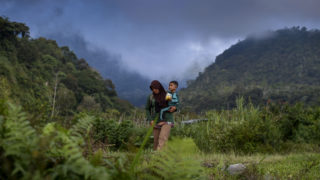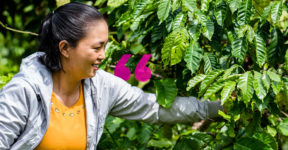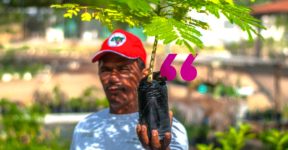
Five key themes from the 2021 Global Forum on Forest Governance
This year, Chatham House’s annual Global Forum on Forest Governance (12-13 July) hosted another stellar line up of speakers and was joined by an audience of over 590 people, discussing topics from participatory legal reform, the role of forests in rural livelihoods, and how international agricultural supply chains can help tackle deforestation.
As always, it was a lively debate, with contributions from representatives of governments, multilateral agencies, indigenous peoples, companies, academia, and civil society.
Here are five of the key themes that emerged from the two-day event:
Companies, governments and other actors must respect the rights of indigenous people and other forest-dependent communities by gaining their free, prior and informed consent (FPIC) before embarking on new projects and economic activities.
Discussion or information sharing is not enough. As Tanja Venisnik of Client Earth said - "Let's make sure that the 'C' in FPIC stands for 'consent' and not 'consultation'”.
"It's important to hear the voices of those who live and defend our land," sais Ketty Marcelo Lopez, of OMIASEC in Peru. "Often we are called 'environmental defenders', but we don't just defend the environment – we defend life."
Consent and the engagement of people in decision-making is vital not just from a rights perspective, but for the long-term success of initiatives. "If we do not have local communities owning these processes, sustainability is going to be difficult", said Roselyn Fosuah Adjei of Ghana's Climate Change Directorate.
Solving land tenure issues - by formally recognizing people’s rights over the land where they live - will give us the “biggest boost possible for sustainable forest management”, according to Carlos Manuel Rodriguez of the Global Environment Facility.
Nonette Royo of The Tenure Facility reminded us that almost 20% of the world's carbon is held in indigenous peoples' land. Securing land rights can prevent deforestation and tackle climate change.
But more than that, forests provide both a home and a livelihood for many people - securing land rights is vital for their dignity, wellbeing and security.
Illegal logging and corruption are huge challenges – we urgently need to improve transparency and accountability to help overcome them.
León Jorge Castaños of the National Forestry Commission in Mexico explained that organised criminal groups have moved from drugs to illegal logging – as they see there's money to be made.
But there are solutions. Independent forest monitoring is a valuable tool for tackling corruption, according to René Ngongo of OCEAN from DRC, and government institutions also need to be strengthened.
Improving citizens’ understanding of the law is also of critical importance in strengthening accountability, which is one of the priorities for Comptoir Juridique Junior in the Republic of the Congo, as Gady Ines Mvoukani highlighted.
International partnerships are vital for the sustainable management of land and forests. Consumer countries have a role to play in encouraging legal and sustainable trade, and also in reducing their own consumption.
Such partnerships will be key to addressing deforestation. Heidi Hautala, Vice-President of the European Parliament, called for new measures and tools for this purpose: “The EU’s FLEGT Voluntary Partnership Agreement (VPA) system has been truly pioneering – however it's 20 years old and there needs to be an upgrade of the VPAs."
The need for countries to work in equal partnership was also highlighted. Alue Dohong, Indonesian Vice-Minister for Environment and Forestry, commented on the importance of close collaboration between consumer and producer countries, as well as a strong market system. The need for open dialogue between countries was also noted by Chris Beeko from Ghana’s Forestry Commission, in order to establish a shared understanding of objectives and of how to achieve these.
The need for sufficient investment in forests, and in the institutions governing forests, was a theme underlying much of the discussion. Rosalie Matondo, Congolese Minister for Forest Economy, highlighted the need for support from consumer countries to strengthen government institutions.
Nonette Royo commented that there needs to be a step change in the scale of funding that is being put into support for processes for the formal recognition of tenure rights. New and diverse ways of disseminating funding also need to be found, so that it can become accessible to those living in forest areas, a point also highlighted by David Kaimowitz from the FAO.
Carlos Manuel Rodriguez highlighted the need to change the economic incentives: "We need to be prepared to pay owners of forests for the environmental services they provide. $5 per tonne of carbon is an insult – this is a huge market failure".
Thank you to everyone that joined the Forum on Forest Governance and helped make this year’s event another success.
If you missed or would like to re-watch any of the five panel discussions, you can view the recording here.


